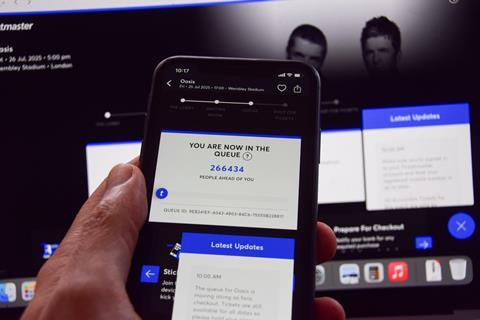
Until Saturday, I’d never heard of the term ‘dynamic pricing’. Then, I tried to buy tickets to 1990s band Oasis’s reunion tour. Now, I’m obsessed about those two annoying words, mainly because I’m still fuming that I don’t have any Oasis tickets sitting in my Ticketmaster account.
I’ve never bought tickets to a major gig before. But seeing Oasis send the country into a nostalgic frenzy after announcing a reunion tour, I knew getting hold of tickets wouldn’t be easy.
I set up my Ticketmaster account nice and early. I read the rules: maximum four tickets per person or four tickets per household per show. Ticket prices were widely publicised, so I knew standing tickets would cost £150 and seated tickets might go up to £205. I watched TV news segments on what to do, and importantly what not to do, to have the best chance of getting tickets.
After failing to get into the pre-sale ballot on Friday evening, I woke up early on Saturday and logged into my account. At about 8.20am, I was in the waiting room. At 9am, I was in the queue: 74,000 people were ahead of me.
At 11.54am I received an update telling me tickets were still available ‘but inventory is now limited and not all ticket prices are available’.
At approximately 2.04pm, I reached the front of the queue and received a shock: tickets were still available, but the prices had gone up. Significantly.
The tickets I was hoping to buy had more than doubled in price.
I knew I only had a few minutes to buy them. Having waited five hours, should I just bite the bullet and pay over £800 for two tickets? With seconds to spare, I decided I just couldn’t justify the cost, and with a heavy heart, came out of the sale.
I and many others have since learned that the tickets were subject to ‘dynamic pricing’.
‘Dynamic pricing is a pricing strategy in which businesses set flexible prices for products or services based on current market demands. The price changes are carried out by software which collects data and uses algorithms to adjust pricing according to business rules,’ Lewis Silkin's Geraint Lloyd-Taylor and Helen Hart explained on the law firm’s website.
Dynamic pricing is legal. Though, Lloyd-Taylor and Hart said: ‘Businesses can effectively charge what they like and what the market will bear. But that doesn't mean that the law doesn't have something to say about dynamic pricing techniques.
‘It can be a breach of the Consumer Protection from Unfair Trading Regulations 2008 (and soon, the new Digital Markets, Competition and Consumers Act) if a trader materially misleads consumers regarding the price of goods and services, if that causes the average consumer to take a different “transactional decision”.
‘In this case, many consumers might not have joined the queue had they known that the price would have increased by the time they were able to purchase, and many fans could not afford the increased price.’
Had I known dynamic pricing was in play, I wouldn't have queued for five hours.
Ticketmaster’s purchase policy states it sells different types of tickets. ‘Platinum tickets’ are ‘in-demand tickets that are offered for sale at market-driven prices, which may be higher than the price stated on the Ticket. Platinum Tickets are sold on a ticket-only basis and do not include any additional products or services'.
I wish I had read the policy before I joined the queue. Equally, in the same way it was made clear that I could buy a maximum of four tickets, I wish it had also been made clear before I joined the queue that ticket prices might go up depending on demand.
The fallout from Saturday continues. The government's review on ticket sales is being widened to include dynamic pricing. Consumer rights group Which? has urged the Competition and Markets Authority to clarify whether the dynamic pricing approach experienced on Saturday is legal under current rules.
In the meantime, I'll continue to look back in anger.




































10 Readers' comments